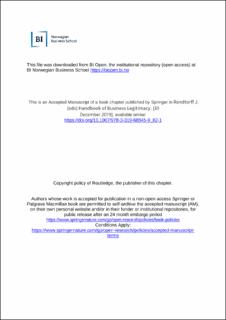| dc.contributor.author | Wong, Sut I | |
| dc.date.accessioned | 2022-04-04T12:00:35Z | |
| dc.date.available | 2022-04-04T12:00:35Z | |
| dc.date.created | 2020-10-02T11:27:34Z | |
| dc.date.issued | 2020 | |
| dc.identifier.citation | Rendtorff J. (eds) Handbook of Business Legitimacy | en_US |
| dc.identifier.isbn | 978-3-030-14621-4 | |
| dc.identifier.uri | https://hdl.handle.net/11250/2989617 | |
| dc.description.abstract | The increasing trend of Internet technology platforms and its offerings of digital labor have revolutionized the world of work. Companies that compete in this so-called gig economy are breaking away from traditional work arrangements and using a business model that challenges current employment and labor laws. While gig economy employers boast the benefit of work flexibility, their workers face compromised fairness in regard to compensation, working conditions, and career development. This chapter discusses how the gig economy redefines the future of work, by focusing on the current state of gig workers, and then explores opportunities for ways in which the gig economy can mutually benefit the employers and its workers. | en_US |
| dc.language.iso | eng | en_US |
| dc.publisher | Springer | en_US |
| dc.relation.ispartof | Handbook of Business Legitimacy. Responsibility, Ethics and Society | |
| dc.subject | Digital labor | en_US |
| dc.subject | Gig economy | en_US |
| dc.subject | Working conditions | en_US |
| dc.subject | Career development | en_US |
| dc.title | The Future of Work, Digital Labor, and Business Legitimacy | en_US |
| dc.type | Chapter | en_US |
| dc.description.version | acceptedVersion | en_US |
| dc.rights.holder | Springer | en_US |
| dc.identifier.doi | 10.1007/978-3-319-68845-9_82-1 | |
| dc.identifier.cristin | 1836535 | |
| dc.relation.project | Norges forskningsråd: Research Council of Norway (RCN) 275347 | en_US |
| dc.relation.project | Norges forskningsråd: Research Council of Norway (RCN) 247725 | en_US |
| cristin.ispublished | true | |
| cristin.fulltext | postprint | |
| cristin.qualitycode | 1 | |
